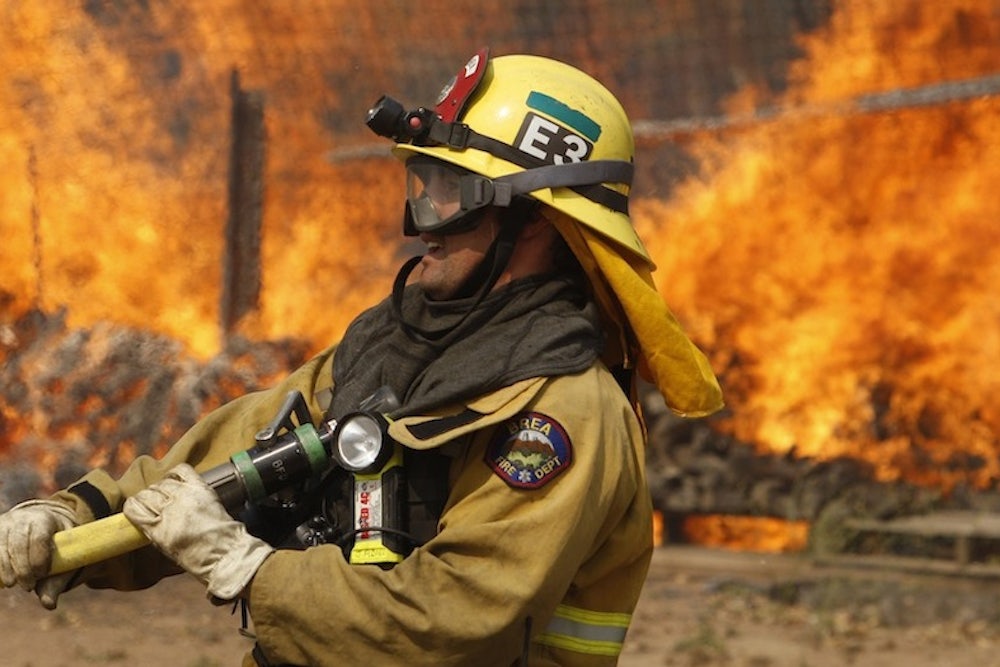Wildfires are driving hundreds of people away from their homes in places like Oregon, Washington, as well as California. It’s a familiar story this time of year, although it doesn’t always get the attention it deserves in Washington—maybe because the problem is so regional. That’s a mistake. Wildfires cause millions in property damage. Sometimes they take lives, too. And as Reid Wilson writes at the Washington Post today, experts think this year’s season will break records, fueled by especially tough conditions like drought in the West.
But there’s a better way to fight them—by preventing them in the first place. Congress sets the U.S. Forest Service and Interior Department budget for firefighting based on the 10-year average of wildfire suppression. With climate change, this calculus makes very little sense. In eight of the last 10 years, the Forest Service has run out of funds. And when that happens, it must dip into its other programs, including the one that helps prevent wildfires in the first place. Wildfire prevention tactics include everything from controlled fires, to clearing acres of dead trees and dry brush.
Over the last two decades, the Forest Service has had to direct more of its resources to actually fight fires, doubling the number of firefighters while cutting 30 percent of its staff in other areas. Back in May, the Interior forecasted it would again fall short of the $1.8 billion needed.
Both western Republicans and Democratic lawmakers agree this is a big problem—even if Republicans fail to mention how climate change is worsening these fires. President Barack Obama proposed a disaster fund separate from the agency’s normal budget, and more recently requested $615 million in emergency aide. The idea has support from some Republicans. Others like John McCain, Jeff Flake, and John Barrasso have proposed a bill that also creates a limited disaster fund but significantly expands logging in forests, too (environmentalists say the bill goes too far to promote logging without oversight).
Any proposal, however, is sure to incite familiar battles between the two parties over the role of the Interior and Environmental Protection Agency.
—Rebecca Leber
Things to know
DEATH PENALTY: A federal judge struck down California’s death penalty, declaring it unconstitutional as cruel and unusual punishment. Close to 900 people are on California’s death row. (Los Angeles Times)
WALL STREET: In her testimony this week, Janet Yellen warned about potential excessive valuations of social media companies. But is it her place to issue such warnings? (Neil Irwin, New York Times)
IMMIGRATION: House Democrats may use legislative procedures to force a vote on comprehensive immigration reform as part of the supplemental. But Republicans have a way to block it. (Greg Sargent, Washington Post)
HOBBY LOBBY AFTERMATH: Senate Republicans filibustered the Democrats’ answer to the Supreme Court decision, which would have ensured for-profit corporations included contraception in their insurance policies. (MSNBC)
Also, read this amazing account of how Senate candidate Scott Brown took shelter in a bathroom in order to avoid questions from Paul Lewis of The Guardian on Hobby Lobby. (Steve Benen, MSNBC)
HEALTH: The FDA found more than just smallpox in a long-forgotten storage room in Maryland. It also found numerous other deadly pathogens. (Brady Dennis and Lena H. Sun, Washington Post)
Things at QED
Paul Ryan really does want to help the poor, but Danny Vinik tells you Ryan has no idea what he's doing. Also, an important reminder that single motherhood does not cause poverty any more than marriage solves it.
